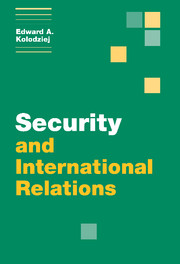Book contents
- Frontmatter
- Contents
- Tables and figures
- Acknowledgments
- Introduction
- Part I Introduction to international security and security studies
- Part II Contending security theories
- 4 Realism, neorealism and liberal institutionalism
- 5 Economic liberalism and Marxism
- Part III Validating security theories
- Conclusions
- References
- Index
4 - Realism, neorealism and liberal institutionalism
Published online by Cambridge University Press: 04 December 2009
- Frontmatter
- Contents
- Tables and figures
- Acknowledgments
- Introduction
- Part I Introduction to international security and security studies
- Part II Contending security theories
- 4 Realism, neorealism and liberal institutionalism
- 5 Economic liberalism and Marxism
- Part III Validating security theories
- Conclusions
- References
- Index
Summary
THE MANY FACES OF REALISM: PESSIMISTIC AND OPTIMISTIC VIEWPOINTS
Pessimistic realism
The triumvirate of chapter 2 comprises the classical school of realism. As realist theory has progressed over the years, notably since World War II with the 1948 publication of Hans Morgenthau's seminal Politics among Nations, the assumptions of traditional theory have undergone substantial reformulation. These revisions have been induced by massive changes in world politics during and especially after the Cold War. These fundamental shifts in power and the rise of new and influential actors on the world stage have been the products of the disintegration of Europe's empires, the expansion of the nation-state to include all peoples of what is now a world society of diverse and divided peoples, the relentless growth and extension of capitalist markets, the rapid diffusion of technology, real-time worldwide communications, the progressive march of democratization, and the rising demands of populations everywhere for a greater say in their government, the protection of civil liberties, and basic human rights.
As international relations have changed so also have realists attempted to keep pace with these “realties,” while asserting the relevance of their core concepts as timeless and true. This school of thought embraces a wide range of scholars who often differ, sharply and seriously, among themselves. They are loosely held together and distinguishable from other schools of thought by several key assumptions they share about international relations and security.
- Type
- Chapter
- Information
- Security and International Relations , pp. 127 - 174Publisher: Cambridge University PressPrint publication year: 2005



